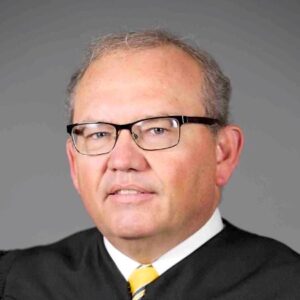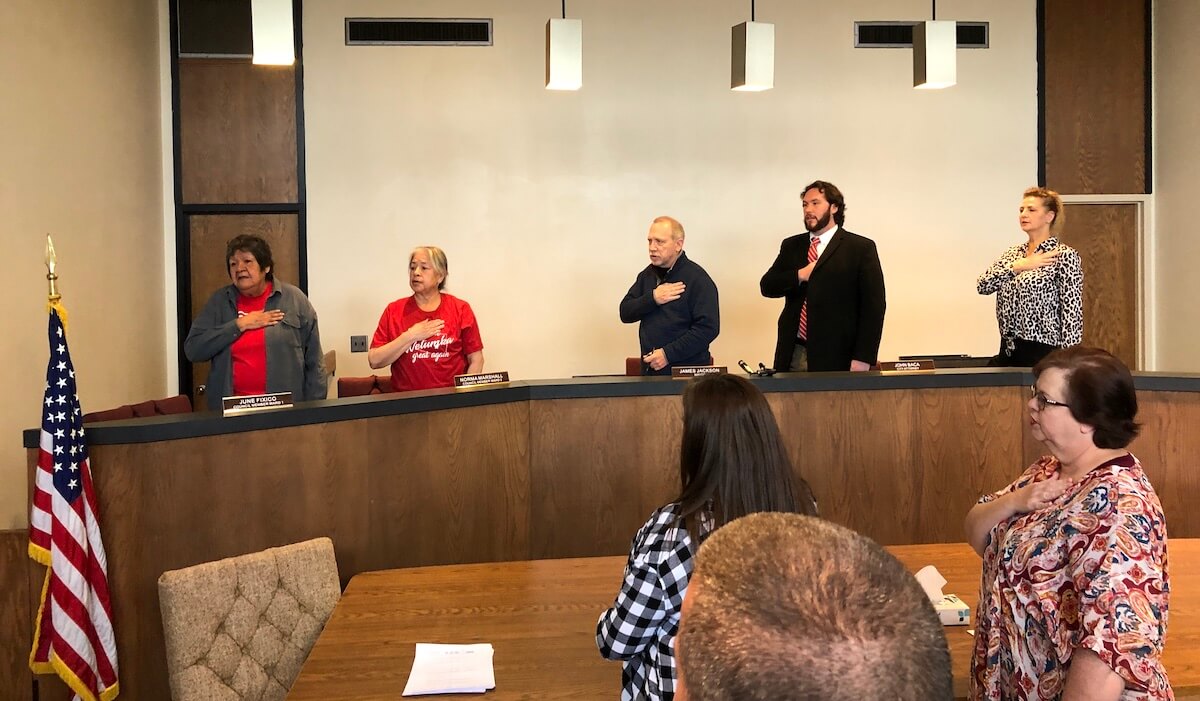
(Editor’s note: The following article includes allegations of rape and abuse.)
HUGHES COUNTY — Despite initially sentencing former Wetumka Councilwoman Rebecca Jackson to four years in prison for her role in a child pornography and sexual abuse conspiracy with her husband, District Judge Timothy Olsen slashed the former pharmacist’s sentence in May to release her from prison after only 258 days of incarceration.
In making the decision — which even he called unusual — Olsen disregarded the recommendation of Hughes County’s district attorney and the Department of Corrections’ judicial review accountability plan, which questioned the validity of claims in Rebecca Jackson’s application for relief.
“Jackson reported that she has completed several religious based programs. She has not completed any DOC sanctioned programs nor (is she) on the waiting list for any,” DOC administrative programs officer Linn Jones wrote April 20. “Due to the extreme seriousness of these crimes, it is respectfully recommended that Rebecca Jackson be denied a sentence modification.”
But May 2, only eight months after Rebecca Jackson had entered prison, Olsen cut his original sentence for her by more than half. As justification, he cited her military service, cooperation, conduct while incarcerated and lack of prior convictions.
On May 15, Rebecca Jackson walked out of Eddie Warrior Correctional Institute and moved to south Oklahoma City. She faces nine more years of probation and the threat of further inquiry in Illinois, where she and her then-husband, James, had been under investigation by local police and the FBI when they moved to Hughes County in 2017 and were both elected to the Wetumka City Council.
After dividing the town over financial matters, suspicious behavior and the termination of multiple police chiefs, the Jacksons’ one-term political tenures ended with a January 2020 resignation. In March, James Jackson was arrested after sex crime charges were filed in Illinois. In April, then-District Attorney Paul Smith filed child pornography conspiracy charges against both Jacksons in Hughes County, Oklahoma.
In June 2022, Olsen sentenced James Jackson to 15 years in prison and 15 years of probation, and he sentenced Rebecca Jackson to four years in prison and six years of probation. He specifically addressed her culpability when he announced her sentence.
“There are and were victims associated with these types of crimes,” Olsen said. “Also, as an aggravating circumstance, the court looks at the length of time she participated in this criminal activity.”
Since her release from prison in May, Rebecca Jackson has not registered as a sex offender, despite its requirement in her original plea agreement. Her modified sentence also references “special supervision conditions for sex offenders filed of record,” although her 2022 guilty plea did not include the aggravated possession of child pornography charge she faced.
Meanwhile, no employee of Oklahoma’s criminal justice system provided notice of the May judicial review to the publicly known victim of James and Rebecca Jackson, a former ward of the state in Illinois who told authorities the couple abused her physically, sexually and mentally from age 14 to 21.
In February 2020, she convinced the Jacksons to let her leave their downtown Wetumka residence for a return trip to Illinois. After speaking with a friend about her situation, she messaged a police officer and ultimately alerted the FBI to a massive stash of child pornography and at least one video of James Jackson performing oral sex on a dog.
Asked why no one contacted Autumn Jackson about Rebecca Jackson’s application for judicial review, new Hughes County District Attorney Erik Johnson said the shared computer files of his predecessor had been deleted before their transition of office in January.
“There was no documentation in the files of the victim’s contact information,” said Johnson, the DA for District 22. “And so, generally, you would go to your victim witness coordinator to have that contact information, but then her files were completely deleted.”
Johnson provided NonDoc a sworn affidavit from the District Attorneys Council’s technology division director saying the “user drives” for both Smith and former District 22 victim coordinator Jennifer Conn “contained empty folders” with “no relevant data.”
Although Johnson said case files existed when he took over, other official correspondence and records were clearly missing.
“I wanted to look on the shared drive of what the District Attorneys Council had,” Johnson recalled. “They said, ‘Well there’s nothing here, which we’ve never seen before.’ And when they said that, I was like, ‘What do you mean you’ve never seen that before?’ They said, ‘Dude, we’ve never seen this before where just everything is wiped clean.'”
Smith, who now teaches at Holdenville High School, said he did not know Rebecca Jackson had been released from prison, nor whether Autumn Jackson had been contacted.
“I believe the assistant DA handling the case would be very conscientious about making those attempts,” Smith said by text message. “Her contact information would have been available in the paper files on the cases.”
Asked why his DAC shared drive would have been empty, Smith said he did not want to comment until he understood the situation better.
Attorney General Gentner Drummond’s office said in a statement that “the alleged conduct of the former district attorney should be concerning to all Oklahomans who care about protecting victims and upholding their rights.”
Drummond himself said any victim in a case like the Jacksons’ should be notified of a sentence modification hearing.
“It is best practice, and it is required by law,” Drummond said.
In 2018, 78 percent of Oklahoma voters approved Marsy’s law, a constitutional amendment enshrining certain rights for victims, including the right “to be heard in any proceeding involving release, plea, sentencing, disposition, parole” and other decisions.
‘They are the ultimate scam artists’

About 760 miles north of Wetumka, 24-year-old Autumn Jackson was pulling into a Chicago parking garage when a text message informed her of Judge Timothy Olsen’s decision to release one of her abusers from prison in May.
“I really stepped on the brakes. I was like, ‘I’ve got to put the car in park,’ and I just started freaking out,” Autumn Jackson said. “I think I lost two hours of time. I went on almost another two hours of driving trying to clear my head and calm down and get things figured out, and I remember thinking, ‘I am so happy I am not in an office right now because there is no way I could keep it together.'”
Stunned by Rebecca Jackson’s early release from prison without receiving the proper victim notifications required by the Oklahoma Constitution, Autumn said she screamed a little when she saw a photo of one of her abusers seated in an Oklahoma City bar.
“It made me really upset that she was out having a good time while I was grateful that I wasn’t in an office bathroom — again, because that’s a consistent thing that I find myself doing, being in office bathrooms crying because it’s an anniversary, or someone said a phrase that used to be said to me in a hurtful way, or something triggers something — and she is just so relaxed,” Autumn Jackson said. “She can go out in public and have a drink and go to a concert by herself. And that just is not true at all for me. I can do it, but I can’t do it like that.”
Having noted the loss of her innocence and identity in the eviscerating victim impact statement she read at her one-time legal guardians’ June 2022 sentencing, Autumn Jackson still ponders whether to change her name — again.
The last time she changed it legally was in the Hughes County Courthouse more than four years ago. Wondering why she was not invited to return for Olsen’s reconsideration of Rebecca Jackson’s sentence, Autumn said the “lack of accountability” and the “numbness” feel familiar.
“I’m just not surprised as much as I expected to be and hoped to be, and I say that sadly,” Autumn Jackson said. “It seems like maybe a combination of being desensitized and just expecting that things aren’t going to go well with the justice system.”
While she lacks surprise, she has plenty of questions for the judge.
“I just wonder if he thinks Rebecca wouldn’t take advantage of a girl in his life. Or him. He saw that those people have no limits on how they hurt or how they take advantage. Anything to get just an inch above the next person. Just to cover themselves one more day,” she said. “They are the ultimate scam artists, and I don’t understand why he let himself be scammed. He’s reasonable. He’s an educated man. Does he not see criminals every day? Does he not get fed lies every day? Why were these able to go through after everything? I don’t get it.”
Judge: ‘She should have probably been notified’
Asked about his decision, Olsen said he needed to speak cautiously because James Jackson has filed a flood of pending appeals and Rebecca Jackson remains on probation.
“I don’t want to violate my rules of professional conduct,” Olsen said.
Generally, Olsen said he relies on the district attorney’s office to meet Oklahoma’s constitutional responsibility for notifying victims prior to hearings.

“Most of the time, I ask if they had complied with it,” Olsen said. “But I think the charges that [Rebecca] actually ended up pleading to — without going back and looking — I think [Autumn] wasn’t listed as a victim to.”
Court records indicate Olsen considered Autumn Jackson a vulnerable witness at one time, however. In April 2020, he approved a witness protection order in Rebecca Jackson’s case allowing Smith not to reveal information about Autumn. Olsen wrote that his order sought “the preservation of their lives from threats, harm or perceived threats and harm.”
In an interview with NonDoc, Olsen said sentence modification can only occur within one year of the original sentence, unless the district attorney agrees to one later. In Rebecca Jackson’s case, the DA’s office opposed Rebecca Jackson’s request this spring.
“It’s not the first time that I’ve done that,” Olsen said. “Sometimes you just feel like it’s something that is appropriate. But she should have probably been notified, I will say that.”
Olsen directed NonDoc to review a transcript of the May 2 hearing, which was made available for $70.
“I think I explained myself. I mean, not that I don’t ever make mistakes,” Olsen said. “But I think I explained my reason for doing it, and one of the reasons was that she was going to have to comply with these strict rules for sex offenders. I don’t recall about the registration part of it, but there are other rules that I can order.”
The May 2 hearing transcript (embedded below) shows Olsen overruled an objection from assistant district attorney Blayne Norman, who contended Rebecca Jackson’s prison sentence should have been ineligible for modification because it stemmed from a plea agreement.
Instead, Olsen agreed with Jackson’s attorney, Irven Box, that she had been sentenced on a “blind plea” instead of a “plea agreement.” In a deal for the aggravated child pornography charge not to be pursued against her, Smith, the district attorney at the time, had offered Rebecca Jackson the chance to plead to three other counts and let the judge determine her sentence. Court records, however, do not show the child pornography charge being dismissed.
“That’s kind of a gray area. I’ve always interpreted it as if the actual sentence were agreed to. That the state would have to not object. But I understand your argument there,” Olsen said to Norman on May 2. “I think it is at least arguable whether a partial agreement qualifies.”
Box then made opening remarks to Olsen, claiming several times that Rebecca Jackson had “done everything possible that she could do” during her eight months in prison and that there was no reason to have her serve the remainder of her sentence.
“I think to keep her in any longer — you know, punishment’s twofold. To really punish or to rehabilitate, I think we’re past that,” Box told the judge.
Box said Rebecca Jackson deserved consideration because she had been “under the control of James Jackson,” her longtime husband, whom she divorced following their arrests.
When Box called his client to the stand, Rebecca Jackson said she retired from the U.S. Army as a first sergeant with a 90 percent disability. Nonetheless, she said she asked her DOC case worker for “more difficult” labor and usually worked “six to seven hours a day, which is uncommon for most prisoners.”
After her release from prison, Jackson said she hoped to volunteer with faith-based programs serving the Hughes County Jail.
“I mentor at least three or four other people in God’s word,” she said. “I tutor two or three other people every night. I try to stay as active as I can. I try to be an example for other women to follow.”
Questioned by Box, Rebecca Jackson said she did not qualify for a “regimented treatment program” at Eddie Warrior Correctional Center where she was incarcerated.
“I actually asked to be reevaluated so that I could get into the RTP program because it’s a semi-military program,” Rebecca Jackson said. “And I really wanted to march and be around people that were more militant. Because the prison isn’t like the Army is. So I’m used to more strict standards. And I was told that I was not able to go back and get reevaluated.”
Norman chose not to cross-examine Rebecca Jackson about the crimes she was convicted of or the other allegations against her, namely that she helped her husband conceal a child pornography collection and that she brought teen girls with a history of abuse into their home to become her husband’s mistress.
Instead, Norman argued to Olsen that DOC recommended against releasing Rebecca Jackson early “due to the seriousness of these crimes.” Norman said the Department of Corrections’ substance abuse survey contradicted the claims made by Jackson and Box.
“She had a defensive score of eight out of 10. And the score suggested that she had a low desire for change or willingness to receive intervention services at that time. That was concerning. That survey was done back in February,” Norman said May 2. “(It) sounds like she is doing well in custody. And I think to say that it serves no purpose would be inappropriate from the state’s point of view. The state believes that she’s being appropriately punished.”
After a brief recess, Olsen opined on the factors he must weigh as a judge and said the decision before him was “not an easy one.” Ultimately, he announced he was decreasing Rebecca Jackson’s sentence in a way that would make her “discharge fairly soon.”
“I’m changing the four years to 18 months. You will get credit for time served and earned. So I will let the Department of Corrections calculate all of that,” Olsen said. “I don’t modify a lot of sentences that are, you know, unless the parties had agreed to it up front, they do sometimes agree to a modification if certain things happen while defendants are in prison. I don’t modify. I can think of maybe a couple I’ve modified after a blind plea but not very often. But I don’t discourage counsel from asking for modifications because there are some times that those are appropriate.”
Follow @NonDocMedia on:
‘It’s really upsetting. Really disappointing.’

Autumn Jackson does not believe it was appropriate for Olsen to reduce Rebecca Jackson’s sentence, particularly when she was neither made aware of the hearing nor given a chance to testify about what James and Rebecca Jackson did to her and other minors.
“She’s very violent. One time, I said I wasn’t scared of Rebecca, and James grabbed me and he slapped me, and he said, ‘If you don’t say that you are scared of Rebecca, I’m going to go in there and tell her, and she is going to beat you to death,'” Autumn Jackson told NonDoc. “If Rebecca picked my punishment, it was worse. It was always harder, longer, everything. Side by side, both (of them are) awful. I don’t want either. But in a fight, I actually think I’d have a better chance with James.”
In Autumn Jackson’s mind, there is little room to separate James Jackson’s culpability from Rebecca’s because the pair were spouses and business partners for 30 years. According to Autumn Jackson, Rebecca carried the keys to the storage units that housed hard drives containing child pornography.
“Rebecca had a lot of freedom. I think Rebecca was James’ equal. He would say and she would say that they were each other’s other half,” Autumn said.
Provided the transcript of the May 2 court hearing to which she was not invited, Autumn Jackson said she could barely read it, calling the statements by Rebecca Jackson, Box and Olsen “surreal” and “incomprehensible.”
JUNE 2022
‘Pretty despicable’: James and Rebecca Jackson sentenced to prison by Tres Savage
“It makes me wonder what else there could be,” she added. “How, with this (negative) recommendation from the Department of Corrections, how with this history, how with her (adult substance abuse survey) scoring being like that, how with just sitting down and having a conversation with her, or listening to anything James has written or said and just comparing the tone — I don’t get it. It’s really upsetting. Really disappointing.”
Box, Rebecca Jackson’s attorney, said he did not consider Olsen’s decision to reduce his client’s sentence unusual.
“It wasn’t very interesting at all,” Box said of the May 2 hearing. “Actually, the judge probably gave her too harsh a sentence to start with, and then we did the judicial review and he granted the review really without the objection of the state. So it’s no big thing or anything like that at all.”
Box said he knew nothing about why Autumn Jackson was not notified of the judicial review hearing. He also dismissed Autumn Jackson’s statements about Rebecca Jackson’s culpability.
“Autumn’s a mess, and I understand she’s got a right to be a mess. I’ve cross-examined her at a deal, and she was not very truthful,” Box said. “I understand she’s come a long ways.”
Asked if Rebecca Jackson would be willing to answer questions, Box said, “She won’t.”
“I will not let her talk to you one second, I’m sorry,” he said.
Jacksons investigated by Illinois police in 2015, FBI alerted

When they moved to Oklahoma from Illinois, James and Rebecca Jackson had already been reported to local and federal law enforcement agencies for allegations of physical, sexual and mental abuse.
In 2019, then-Wetumka Police Chief Joe Chitwood drove to Fulton, Illinois, and met with officers about James and Rebecca Jackson. Fulton detectives provided him a September 2015 report, which originated after a call from the principal of Fulton High School who was concerned about Autumn Jackson, then known as Paula Israel.
The principal reported a series of emails sent by James Jackson, and officers listed both James and Rebecca Jackson as suspects in their report. In addition to the principal, victims were listed as Paula Israel and a second woman whose family members had reported concerns.
According to the report, the principal advised that:
- “The Jacksons were sexually abusing [the second woman] and keeping her from coming forward to report it by use of threats to her family and to her;”
- “[The woman] is being used as a ‘sex slave’ against her will by the Jacksons.”
The woman, who requested her name be withheld from this story owing to concerns about her safety, was interviewed by Fulton police in 2015. According to the report, the woman said Rebecca Jackson introduced her to James Jackson.
“The Jacksons took control over her life and made almost every [one] of her decisions for the next three years,” Fulton officers wrote. “James and Rebecca continued to use her for sex. Rebecca participated, but only when James wanted her to. [The woman] verbally objected to the sex, but felt like she had no control over the situation. When she would object, James would tell her that they do everything for her, and that she needed to participate in the sex. James would sometimes become physically abusive by throwing her against the wall, choking her and threatening to kill her parents if she didn’t do what he wanted. (…) Over time, she believes that Rebecca began to hate her. Rebecca still told her to give James whatever he wanted.”
The police report details a series of other allegations regarding rape and abuse.
“She believes that Paula is definitely in danger while living with the Jacksons,” officers wrote. “Rebecca told her that if James were to tell Rebecca to kill her, she would pull a gun out and shoot [the woman] in the head. She also told her that she would kill her entire family and not to underestimate her.”
According to the report, however, the woman called Fulton police again three days later and said she was too afraid of the Jacksons to pursue the investigation further. The report concludes with a “supplemental narrative” dated a year later in October 2016.
“This case along with a copy of the case file was transferred to [Special Agent Andrew Kehren] of the FBI Rockford, [Illinois], office,” the report states. “The investigation is hereby turned over to the FBI for further investigation.”
Ultimately, the FBI was contacted again about the Jacksons regarding their behavior in Wetumka, and FBI agents were involved in the Jacksons’ arrests and prosecutions.
The woman in the 2015 Fulton police report spoke with NonDoc on the condition of anonymity, expressing shock and fear after learning Rebecca Jackson had been released from prison without Autumn even being alerted.
“A lot of people don’t get to live the situation I lived and talk about it,” the woman said. “It is a big thing for me. This has ruled my life for a really long time. I have lived in fear ever since I left them. Even though they were in Oklahoma, I still lived that way. And now I’m nervous as hell, too, because she’s out.”
The woman recalled a previous conversation she had with federal investigators.
“Just like I told the FBI agent, when she does get out, what are you guys going to do for me? Nothing,” the woman said. “If she comes here (…) pulls out a gun and shoots my mom or dad or my fucking kids, they’re not going to do anything. She’ll go back to prison? OK. But they’d already be dead.”
The woman agreed with Autumn Jackson’s analysis of Rebecca Jackson being the “equal” of James Jackson, saying they both are dangerous.
“This is how people end up getting killed,” the woman said. “They let certain people out when they shouldn’t let people out. That’s what’s wrong with our system.”
Read a transcript of Rebecca Jackson’s May 2 hearing
 Loading...
Loading...
Read the affidavit about document destruction in DA District 22
